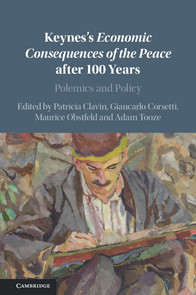 Keynes’s Economic Consequences of the Peace after 100 Years
Keynes’s Economic Consequences of the Peace after 100 Years
Polemics and Policy
Edited by Patricia Clavin, Giancarlo Corsetti, Maurice Obstfeld, and Adam Tooze
Cambridge University Press
Cambridge, UK,
2024, 451 pp., $155
Few books in economics deserve much notice a century after their publication. One that does is John Maynard Keynes’s The Economic Consequences of the Peace, published in 1919. The short tract is a scathing indictment of the Paris Peace Conference after World War I and the reparations demanded of Germany. With its blend of sharp analysis, vivid prose, and polemic disgust, the book was an immediate sensation. It generated enormous controversy and made the English economist famous worldwide. The book is still remembered for lamenting the bygone era of pre-1914 globalization and its vivid sketches of the principal protagonists, including Georges Clemenceau, David Lloyd George, and Woodrow Wilson.
The 100th anniversary of The Economic Consequences, in 2019, was the occasion for a major conference in Cambridge, England. This volume is the result. The book brings together historians, political scientists, economists, and economic historians to weigh in on many aspects of Keynes’s book and its enduring influence. The editors conceive of it as a “concerted reflection on the terrible events and the underlying factors that a hundred years ago undermined decades of unprecedented economic globalization, destroyed empires, and redefined the balance of power among regions and countries.”
The editors open with a panoramic view of the past century. So much of the 20th century was shaped by the failure to establish a lasting order after World War I. Keynes was prophetic about the potentially catastrophic consequences of the Paris conference. The 1920s and 1930s were indeed terrible decades filled with economic and political turmoil, culminating in another disastrous world war in the early 1940s. Only after World War II was Keynes’s vision of strong international economic institutions providing stability finally realized.
There are 16 substantive chapters. While there’s not room to address them all, Michael Cox provides an informative chapter that sets out the reasons Keynes wrote the book and its reception once published. Cox notes that modern historians have been “generally quite critical of Keynes” and believe that he “just got a lot wrong.” Keynes’s work “continues to seduce people into thinking that Versailles was a total failure,” while historians—having greater sympathy than Keynes did at the time for the constraints under which the negotiators were operating—view it as a flawed or incomplete success. Still, it is certainly the case that, as Harold James and Andrew Koger point out, “The Paris Peace Conference failed fundamentally in its objective of creating a durable and just world order.”
Among economists, the book is best remembered for Keynes’s claims about Germany’s inability to pay the punishing reparations bill and his analysis of the transfer problem. Keynes feared that in “demanding the economically impossible of Germany the allies would not only be hurting themselves . . . but would make any kind of European recovery impossible,” as Cox puts it. In fact, the Treaty of Versailles in 1919 did not specify how much Germany should pay; the gap between what France believed it should pay and what could realistically be paid was simply too great. The figure was set only in 1921, and even Keynes thought that amount was more reasonable; in any event, Germany paid very little because the reparations schedule was revised in light of Germany’s hyperinflation in 1923. But the political damage of attempting to extract a lot was done.
The debate about whether Germany was asked to pay too much in reparations is considered in several chapters. Peter Clarke assesses the views of Keynes’s critics on this point. Simon Hinrichsen very usefully compiles data on past indemnities and reparations to put the Germany World War I case in historical context. In the end, Keynes was probably wrong about the capacity of Germany to pay but right about the political consequences of trying to make it do so.
The book, of course, deals with much more. Chapters are devoted to the responses to Keynes’s book by economists and policymakers in Sweden, France, and Türkiye. Other chapters discuss Keynes as a foreign exchange trader, interwar international trade politics, the gold standard and the tripartite monetary agreement of 1936, the evolution of the international monetary system since 1919, and the evolution of Keynes’s thinking on the international economy from 1919 to Bretton Woods.
This informative volume serves as a reminder that the international system always reflects a mix of economics and geopolitics. With the rise of economic nationalism today, and the associated concerns about international security, the book is, unfortunately, a very sobering reminder of the stakes involved.
Opinions expressed in articles and other materials are those of the authors; they do not necessarily reflect IMF policy.







